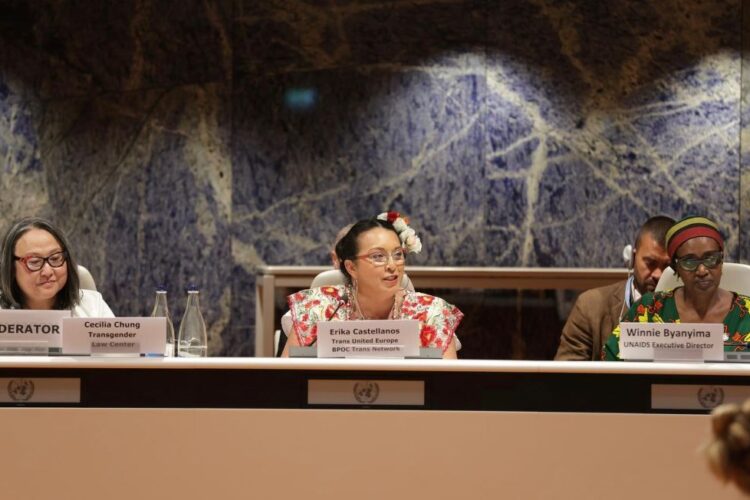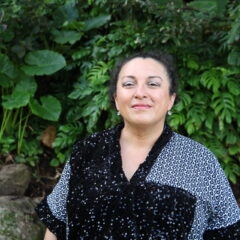Keynote speech delivered by Erika Castellanos, Executive Director – Global Action for Trans Equality (GATE); PCB NGO Delegate – Europe
Ma’alo’ob k’iin ti’tulaakal.
Maanen.
Good morning everyone and welcome.
My name is Erika Castellanos. I am a transgender woman of Mayan descent. I was born in a small town in western Belize. I come from a line of matriarchs, women who cared, cured, made offerings to mother earth, made decisions based on the stars and helped bring children to this earth. Women who instilled in me the spirit of resilience and the philosophy to look at the good and ignore the not so good. And would I need those teachings in my life…
Just two weeks ago, I was reflecting on my journey and how lucky I was. Yes lucky – none of us should rely on luck for anything but the reality is that the fact that I am alive and with you here today has a lot to do with luck.
You see, I grew up in a country in which at the time – I would be considered a criminal for who I am, for my gender identity. I grew up with my family unsure of what to do and how to love me because they had no information, no support, and the law and religion told them I was wrong. I grew up with nightmares. Nightmares of burning in hell because that is what the local priest told me would happen to me if I did not change. I have the scars of the abuse I had to go through in a so-called clinic that was going to cure me. Fingers were pointed at me, schoolmates made jokes – I felt dirty, I felt unsafe.
In my journey to find my place in this world, I migrated to another country at the age of 16. And no, I will not tell you how long ago that was – cause I don’t want you to start doing the math to know my age. I migrated to a country, to a city where I knew no one. Without the skills, I need to survive on my own. But I felt happy – I felt free – free to be who I really was.
Naive me, the euphoria lasted only a short time. I quickly learned that the world is a very cruel place. I ended up on the streets, every night trying to find a new place to sleep that could shelter me from the rain or cold. As a survival strategy, I engaged in sex work – and being a sex worker gave me the first breath of independence – the feeling that I could shape my future. Well, that took a while …. On the way, I ended up in prison – not one or two – but many times … accused of acts against good morals. Whatever that means. I engaged in using drugs and was feeling tired of the cold, cruel world.
In 1995 I was diagnosed HIV positive. In a time when there was limited treatment available, when frequently a diagnosis was translated as death. In fact, my doctor told me that I had like 6 months to live. I did not die… Then he said, you have like 2 years, you are lucky, he said. I am so stubborn that again I refused to die – probably I was too engaged in trying to prove him wrong. One day at the clinic – amongst wheelchairs, bodies so weak and wasted that all you could see is skin on top of bone … among sad faces and me looking at how I will probably look in the near future and the pain I might be feeling — in that clinic, I met someone that could not stop making jokes – jokes about living with HIV and made other people laugh – that day I made the decision that I want to change things – I want to make people’s lives better and if there is only one thing I could do I wish to at least put a smile on people’s face.
That is my journey – fast track to today – I am here with you all at the PCB, I am the Executive Director of GATE, a global trans, gender diverse and intersex organization, last week I was in the annual meeting of special procedures and I thought to myself – how did I get here? I have been lucky – you see, for trans people, this is luck – this is an exception because we live in a world that is trying to kill us – we live in a world that is so bizarre that, as National Chamber representative of Brazil Erika Hilton said, people get outraged when trans kids have access to gender affirming care, but no one is outraged, and everyone is silent when trans youth and children commit suicide because they are not allowed to be who they are, no one is outraged when trans youth and children are killed by the hands of transphobia. Indeed we live in a world where it is ok to hate me, to kill me, in the name of religion.
Trans people are disproportionately affected by HIV, both in terms of the risk of contracting HIV and the risk of not being able to access medical care – not because we are trans … but because society makes us vulnerable. We are made vulnerable because we don’t have equal access to employment, education, health, housing … in fact, we don’t have equal access to any rights – rights that many take for granted because it is everyday life for you – like getting on a bus, opening a bank account and having a family. Many trans and gender diverse people cannot access health care services because they do not have an identity document that matches the way they look. Others fear accessing health services because of the stigma and discrimination they have experienced at the hands of healthcare workers.
The anti-gender movement tries to erase our existence and is gaining ground. They are well-resourced with finances we cannot compete with. The spread of lies, of intentionally harmful false statements creates fear in those who seem to think we are so different that we deserve a new species classification. No. No, we are simply humans. Humans trying to be equal humans like everyone else. The anti-gender movement poses significant challenges and threats to the lives of trans people and organizations that advocate for transgender rights. This movement undermines the progress made in recognizing and affirming diverse gender identities. Trans people face increased discrimination, marginalization, and invalidation due to the anti-gender rhetoric, which often seeks to delegitimize our identities and deny our access to fundamental rights and resources. Furthermore, organizations dedicated to supporting and uplifting the transgender community face obstacles in providing essential services, education, and advocacy due to the hostile environment fostered by the anti-gender movement.
Yet States continue to take our rights to public consultation – putting them to a vote – as is the case with gender identity laws in many countries. Human rights are inalienable. They are indivisible and interdependent because all rights are equally important, and none can be fully enjoyed without the other. Make no mistake, the rights of trans and gender diverse people is not something that you are to believe in – it is not a religion and does not depend on anyone having faith – at least it should not. When human rights are weakened, when governments decide that some people should have rights and others should not, we all become more vulnerable. The same anti-human rights movement that is attacking the trans and gender-diverse community is attacking the rights of other vulnerable groups, such as migrants, refugees, and women’s reproductive rights. Strengthening access to human rights for one group does not weaken the rights of another – it strengthens the human rights framework and culture for all people.
Yet in many countries, outrageous outdated practices still continue – with the exception of a few countries such as Malta, Argentina and most recently Spain, the vast majority of countries engage in pathologizing practices for access to gender affirming care or legal gender recognition. And there are worse – in many countries access to gender affirming care and legal gender recognition remains but a dream. The day I received my certificate confirming I have a mental condition “gender dysphoria” I was unsure if I should cry, be mad or laugh. I felt upset that I am still having to be declared mentally ill in order to be recognised as myself, but at the same time that senseless piece of paper (from my perspective) will help me access legal gender identity that would otherwise be denied. Shame on us. Yet there is hope, even if we are forced to go though pathologizing practices and humiliating experiences, more than a third of the countries of the world allow change of legal gender. I’ll take that as a win.
We need to do better. We need to stop demonizing – sexualizing and hating trans and gender diverse people. More than allies, we need our fellow humans, our family, our friends, our work colleagues, to see us as equal to, as same as, not different from. When we view the world through the lens of what unites us, rather than what divides us, we have a much better chance of improving the lives, health and human rights of all persons on this earth. And after all, is that what we all really want most of all? To love, and to be loved?
Today we are engaged in this dialogue – I have hope.
Thank you.
Erika Castellanos, Executive Director, GATE






